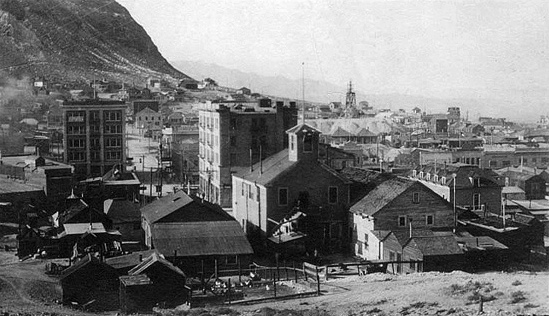Anti-Chinese Riot in Tonopah, Nevada

“Sing Lee Chinese Laundry, Tonopah, NV.” Circa 1870. 0155:0002. Courtesy of the Las Vegas Nevada State Museum. https://lasvegasnvmuseum.catalogaccess.com/photos/63095.
Because of anti-Chinese attitudes in central Nevada, a mob of white union workers attacked Tonopah’s Chinatown in September of 1903. One Chinese man was killed and several others were injured, and Chinatown was destroyed.
Tonopah, Nevada is a small town in central Nevada that popped up in 1900 when silver was discovered in the area. Within a few years, the mining town was booming, and many Chinese immigrants, mainly men, moved to Tonopah seeking opportunity. The Chinese, however, were not actually allowed to mine in this part of Nevada, so they took up jobs as laundrymen and cooks. Although their labor was needed, white miners were still apprehensive about Chinese immigrants in town, and national anti-Chinese laws and broad anti-Chinese sentiment in the Western United States fomented resistance to their presence. Whereas many other outbursts of anti-Chinese violence in the west began when Chinese miners were hired to undercut unionized white miners, the Chinese population targeted in Tonopah were not hired to undercut potential strikes.
On September 15, 1903, a group of about 30-50 white labor union members marched into Tonopah’s Chinatown and demanded the Chinese immigrants living there to leave in the next 24 hours. Later that day, a second, larger group of men came to Chinatown and began destroying the homes and businesses of the Chinese people. The mob burned down over 100 Chinese establishments and was responsible for the death of 66-year-old Chong Bing Long, who owned a laundromat in town and had lived in the United States for over 30 years. Long was not fast enough to escape the men in the mob, who robbed and beat him. They then drove him outside of town to the desert, where they beat him again and left him to die. Though this was the only death, several Chinese people received serious injuries from being beaten, with little being done by local police to protect them.
In the aftermath, the Chinese returned to town to assess the damage. Fifteen white men were initially arrested for their involvement in the riot, but nine were immediately released and the other six were acquitted of all charges. The Chinese pulled all of their resources together to pay to convict members in the mob, but eventually ran out of money and had to stop pursuing the case. The Chinese embassy tried to help, but was largely powerless. Many of the Chinese chose to stay in Tonopah, and several white locals told the Chinese they would, “work out a plan to provide protection” for them. Others left for nearby cities like Reno, and resentment for the Chinese gradually died down in Nevada over the next few years.
Images

“Sing Lee Chinese Laundry, Tonopah, NV.” Circa 1870. 0155:0002. Courtesy of the Las Vegas Nevada State Museum. https://lasvegasnvmuseum.catalogaccess.com/photos/63095.

“Tonopah, Nevada.” Eboess101. June 19, 2014. Via Flickr. https://www.flickr.com/photos/txbo/14342849017/in/photolist-BWSNPa-PnxZ8W-nRqRji-44iJg-Pc93Md-2bjYBGt-2mo3fEB-Pc946j-qfoXY-2mjyJAS-vwjchb-81jh6H-yDSKf-24TMnzG-CQgj1e-2jycnun-Bk7F4j-2njcWh3-zB2z7S-2jxnGom-xrneB-5Kpntj-9x11w-oMi1r3-44iDd-2m6hYFq-43wBD-U3G9Bx-2m6j1ZD-7ZxXAh-HfaHXL-7ZxTZN-7ZuK3g-2fk31As-2j6UeZY-j2Gnoe-7iT7sM-642JtC-7iT6PP-qfp1Y-2ngTgDx-7iT7a8-44izY-ajAfvu-7iT6fn-2cYfwU-eiqB3y-begrdn-6YNhr8-2x1rqP/.


“Scene in Tonopah, Nevada.” Newman Post Card Co. 1907. UNRS-P1992-01-8512.tif; Collection 4393. Used by permission, University of Nevada, Reno Online Digital Collections. https://unr.dgicloud.com/islandora/object/spphotoscollection%3A4393.

“View of Tonopah, Nevada.” F.W. Sheelor. 1913. Courtesy of the Library of Congress. https://www.loc.gov/pictures/item/2007662536/.

“Abandoned Mine and Mill. Tonopah, Nevada.” Arthur Rothstein. March 1940. Courtesy of the Library of Congress. https://www.loc.gov/pictures/item/2017774540/.